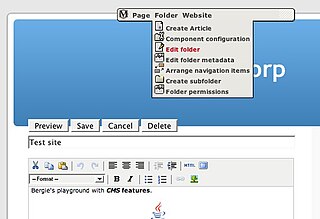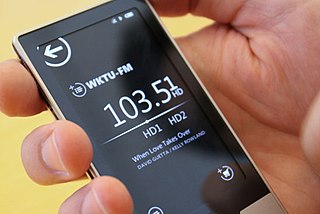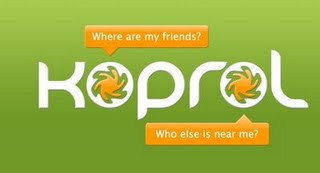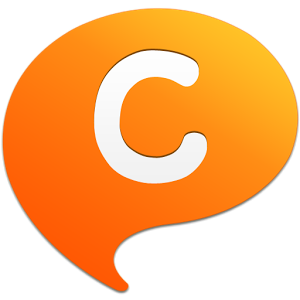In cryptography, a certificate authority or certification authority (CA) is an entity that stores, signs, and issues digital certificates. A digital certificate certifies the ownership of a public key by the named subject of the certificate. This allows others to rely upon signatures or on assertions made about the private key that corresponds to the certified public key. A CA acts as a trusted third party—trusted both by the subject (owner) of the certificate and by the party relying upon the certificate. The format of these certificates is specified by the X.509 or EMV standard.

Midgard is an open source persistent storage framework. It provides an object-oriented and replicated environment for building data-intensive applications.
Browser hijacking is a form of unwanted software that modifies a web browser's settings without a user's permission, to inject unwanted advertising into the user's browser. A browser hijacker may replace the existing home page, error page, or search engine with its own. These are generally used to force hits to a particular website, increasing its advertising revenue.

My Life Online (Mylo) was a device created and marketed by Sony for portable instant messaging and other Internet-based communications, browsing Internet web sites using the Opera web browser and playback and sharing of media files. The pocket-sized, tablet-shaped handheld device, which debuted in 2006, had a screen which slid up to reveal a QWERTY keyboard. The brand name 'Mylo' means My Life Online. Using Wi-Fi instead of cellular networks, the Mylo was targeted to the 18–24 age group.

NeoPlanet was a Trident-shell graphical web browser initially released in 1997 by New York–based Bigfoot International, Inc. and later maintained and developed by its subsidiary NeoPlanet, Inc. It was one of the first browsers to be fully skinnable.

Jaiku was a social networking, micro-blogging and lifestreaming service comparable to Twitter, founded a month before the latter. Jaiku was founded in February 2006 by Jyri Engeström and Petteri Koponen from Finland and launched in July of that year. It was purchased by Google on October 9, 2007.

WOT Services is the developer of MyWOT, an online reputation and Internet safety service which shows indicators of trust about existing websites. The confidence level is based both on user ratings and on third-party malware, phishing, scam and spam blacklists. The service also provides crowdsourced reviews, about to what extent websites are trustworthy, and respect user privacy, vendor reliability and child safety.
Google Friend Connect was a free social networking site, active from 2008 to 2012. Similar to Facebook Platform and MySpaceID, it allowed users to build a profile to share and update information through messaging, photographs and video content via third-party sites which acted as a host for profile sharing and social exchanges.
Ping.fm was an advertising-supported social networking and micro-blogging web service that enabled users to post to multiple social networks simultaneously.

The Zune HD is a portable media player in the Zune product family released on September 15, 2009, by Microsoft. It was a direct competitor with Apple's iPod Touch series of mobile devices. It was initially released in 16 and 32 GB capacities. A 64 GB version was released on April 9, 2010. It has a touchscreen interface for navigation and included Wi-Fi for synchronization, access to the Zune Marketplace and Web browsing.

Kin was a short-lived mobile phone line from Microsoft designed for users of social networking. The phones, aimed at people between ages 15 and 30, were manufactured by Sharp Corporation and sold through Verizon Wireless.
Brightkite was a location-based social networking website. Users were able to "check in" at places by using text messaging or one of the mobile applications and they were able to see who is nearby and who has been there before. The service was created in 2007 by Brady Becker, Martin May, and Alan Seideman who previously founded the SMS notification service Loopnote. In April 2009 Brightkite was acquired by mobile social network Limbo.

Hootsuite is a social media management platform, created by Ryan Holmes in 2008. The system's user interface takes the form of a dashboard, and supports social network integrations for Twitter, Facebook, Instagram, LinkedIn, Pinterest, YouTube and TikTok.
Xiha Life was a multilingual social networking website. It integrates Google's automatic translation software, Google Translate, which enables users to instantly translate comments and posts within the site itself. The user interface has been translated into 42 languages, and the system supports communication in 56 languages. Xiha Life has 750,000 members worldwide, with no single country comprising more than 5% of its membership.

Koprol, since 25 May 2010 called Yahoo Koprol, was an Indonesian social networking service, allowing users to connect based on location. Mobile users can use the site as a positioning service, without the need for a GPS receiver. Once logged in, users can see other members who were in nearby location.
The startup scene in Finland has given birth to companies such as Angry Birds, Supercell, Wolt, and many others.
The Nintendo Network was an online service formerly ran by Nintendo that provided free online functionality for the Nintendo 3DS and Wii U systems and their compatible games. Announced on January 26, 2012, at an investors' conference, it was Nintendo's second online service after Nintendo Wi-Fi Connection. Former president of Nintendo Satoru Iwata said, "Unlike Nintendo Wi-Fi Connection, which has been focused upon specific functionalities and concepts, we are aiming to establish a platform where various services available through the network for our consumers shall be connected via Nintendo Network service so that the company can make comprehensive proposals to consumers."

ChatON was a global mobile communication service provided by Samsung Electronics from September 2011 to March 2015.










